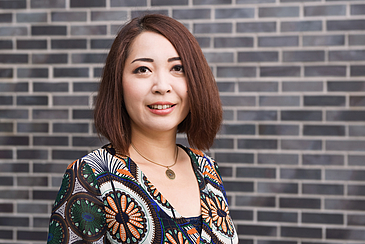“Entrepreneurship” and “refugee” are banner words in the research work of Dr. Aki Harima. Born in Japan, she is a postdoctoral fellow at the Chair in Small Businesses & Entrepreneurship (LEMEX). She recently published a book together with her boss, Professor Jörg Freiling, and Professor Sibylle Heilbrunn, in which 25 authors tell 16 stories of refugees from Syria, Afghanistan, and Iran who have built up their own existence in another country.
“Normal Life in Their Homeland”
Thus, commercial and social enterprises were established in Germany, France, Israel, Ireland, Jordan, and Pakistan – to name but a few. Together with her colleagues, Aki Harima evaluates these case studies to find out what help refugees need to gain a foothold in their own business. “With this book, we want to show that refugees had completely normal lives in their home country that they were abruptly torn away from,” says the economist. Her project in Namibia has also attracted a lot of media attention. She flew with students to Windhoek, where they developed concepts for start-up entrepreneurs directly on-site at the start-up center in Bokamoso.
Enthusiastic Backpacker
Aki Harima welcomes us in her office in the “Haus an der Allee,” WiWi1 for short, and tells us about her life. She was born and raised in Osaka, a glittering city with towering skyscrapers and 2.7 million inhabitants. One of her hobbies helped make her a cosmopolitan and internationally experienced teenager: Aki Harima has been on the road a lot as a backpacker – traveling around the world with a backpack on her back. “I especially like the countries of Europe,” she says. “Their history, their diversity, their similarities and differences.” She inherited this hobby from her grandfather, who was active in physics research in North Rhine-Westphalia. “Germany is a good country. Germans are direct and reason logically,” the deceased grandfather passed on to his granddaughter. While she was still working on her bachelor’s degree at Kobe University in Japan, she completed an exchange year at the private Otto Beisheim School of Management in Vallendar, near Koblenz.
“First Swabian, Now High German”
She then went on to her master’s degree at the University of Mannheim. The 32-year-old speaks German fluently. “First Swabian, now High German,” she laughs. In addition to Japanese, her native language, she speaks English and knows enough Spanish basics for simple conversation. In 2013, after earning her master’s in economics, Aki Harima came to Bremen and then on to LEMEX. “Professor Freiling asked me about my life during the interview, which I found very pleasant,” she remembers. Entrepreneurs who emigrate from industrialized countries to developing countries were the subject of her dissertation – summa cum laude the result. She also received two awards for it. Dr. Aki Harima is now a postdoctoral researcher and also active in teaching.
Six Hours in the Kitchen
On Saturdays, the woman from Japan stands at the stove for up to six hours in her kitchen and prepares meals for the whole week, which she freezes in bento boxes. “Poultry, fish, rice, vegetables,” she says. The slender woman, who eats three warm meals a day, is surprised how many starches and noodles the Germans can eat. Bremen? “The city is very nice, pretty, and international,” says Aki Harima enthusiastically. She has a lot of plans for the near future. When it comes to transnational entrepreneurship, the young academic wants to place networks and resources at the center of her continued research. Her scientific analysis focuses on topics such as the start-up potential of people with a refugee background, the role of transnational entrepreneurs in the start-up ecosystem of Santiago de Chile, and start-up landscapes in developing countries. An entrepreneurial researcher, you could say.
Contact:
Dr. Aki Harima
Research Associate
Chair in Small Business & Entrepreneurship (LEMEX)
Faculty of Business Studies and Economics
University of Bremen
Tel.: +49 421 218-66876
E-mail: harima@uni-bremen.de

